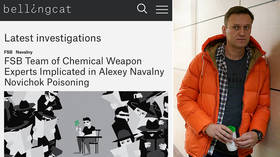Bellingcat reacts badly to scrutiny, but possible ties to Western intelligence should be discussed when considering its work

Bellingcat founder Eliot Higgins once attacked journalists for using anonymous sources, citing a lack of “purity.” Now his outfit, which continues to almost perfectly align with UK geopolitical priorities, is reliant on them.
If past form is a guide, it’s likely Bellingcat staffers will attack this article on social media, labelling it “propaganda” and cherry picking one or two sentences, out of context, in a bid to discredit the whole. But the fact remains the journey of their outfit from a supposedly 'open source' investigation unit to something which increasingly resembles a fully-fledged intelligence agency, or a small, public division of a larger, clandestine organisation, deserves examination.
On Monday, the controversial ‘online investigations’ website published a bombshell exclusive, claiming that Alexey Navalny had been closely followed by a host of FSB operatives on his various travels before he was allegedly poisoned with Novichok in August.
The lengthy presentation also suggested that the Russian opposition figure had been closely followed by undercover officers for years prior, the earliest known occasion having been in 2017.
A similarly verbose accompanying article offers an explanation of how Bellingcat seized upon the seismic scoop, in its own words. The narrative amounts to quite some sleuthing indeed, although details of how Bellingcat came across particular information it used to establish the identities and movements of Navalny’s attackers is highly dubious, for more reasons than one.
The organization claims it secured this sensitive information via a number of black market sources, in particular by using “bots” on the Russian-built Telegram messaging app. For a small fee, these bots allegedly stumped up first the phone number and call records of an individual who'd travelled to the same places as Navalny at roughly the same times, then the identities of people they spoke to in the days prior to Navalny’s poisoning, and later one individual’s vehicle registration information, which indicated his car was linked to FSB headquarters in Moscow.
“While there are obvious and terrifying privacy implications from this data market... a few hundred euros [provides] you with months of phone call data for an FSB or GRU officer, allowing investigators to trace the intelligence services’ operations, identify the colleagues of research targets, and follow the physical tracks of spies across Russia and abroad,” Bellingcat stated.
‘Some kind of intelligence unit’
Extraordinary stuff if true, but while the organization’s probe has been praised widely by mainstream Western media, not all are quite so convinced. In a radio interview, Oleg Kashin, a liberal Russian journalist, suggested the scoop was “Western intelligence services explaining to themselves, and us, who poisoned Navalny and how.”
Kashin has “no doubt” the individuals fingered by Bellingcat were indeed behind the apparent assassination attempt on Navalny – he said their “criminal faces” alone indicate they are “absolute killers” and their hands “are covered in blood.” However, he cast doubt on the methods Bellingcat claims to have employed, based on personal experience.
“These pirated databases exist, and there’s a huge market... Dozens of people within a handshake and a half of us, journalists and otherwise, check people up on police databases,” he said. “But there are certain people, you ask a policeman you know to check them up, and he comes back and says there’s a note there, ‘do not check’, so don’t touch them, take back your money. And special service members definitely have that note next to their names. It’s impossible to check them that way.”
Also on rt.com This is ‘bulls**t’: Kremlin uses English expletive to lash Sunday Times article accusing Russian state of poisoning Navalny twiceHe went on to state his long-held belief that Bellingcat “are not journalists” but “legalizers of leaks made by Western intelligence agencies,” and the organization acts as “some kind of intelligence unit.”
Kashin could hardly be accused of being a Kremlin-sympathizer – on top of his certainty that the FSB was responsible for Navalny’s poisoning, in November 2010 he was assaulted by unknown attackers near his Moscow home, suffering a broken jaw, leg, fingers and fractured skull; one finger later had to be amputated.
During the police interrogation, one of the detained attackers pointed the finger of blame at the then-governor of Pskov, Andrey Turchak, claiming that he asked them to break Kashin’s arms and legs so he couldn’t write. Turchak was never charged, and in 2017 became a deputy chairman of Russia’s upper house of parliament. President Vladimir Putin concurrently awarded him the medal of the order ‘For Merit to the Fatherland’.
Open source?
The stratospheric rise of Bellingcat founder Eliot Higgins from unemployed bedroom-based blogger and videogame obsessive to go-to mainstream media information source is quite extraordinary, and every step of the way he has worn his lack of credentials as a badge of pride. In a March 2014 Daily Telegraph interview noting he was a college dropout, Higgins struggled to even remember which higher education course he’d failed to complete.
His apparently unimpeachable position first began to coagulate in August 2013, when he published a series of articles accusing Syrian government forces of carrying out chemical weapons attacks in Ghouta, drawing his conclusions by collating ‘open source’ material such as videos, social media posts, satellite images, and photographs.
His findings were widely and unquestioningly promoted in the mainstream media, leading Human Rights Watch to enlist his assistance in its own analysis of the contested Ghouta strike, which conveniently reached the same conclusion as Higgins.
However, in subsequent months, Pulitzer Prize winning journalist Seymour Hersh published two articles in the London Review of Books severely undermining Higgins’ case, alleging intelligence had been deliberately manipulated to assign responsibility for the Ghouta attack to government forces, and sarin used in the incident had been supplied to Al-Nusra Front by the Turkish government.
In response, Higgins published a vindictive riposte in the Guardian in April 2014, in particular slamming Hersh for his reliance on anonymous sources. His condemnation of this admittedly oft-questionable practice echoed comments he’d made in a fawning New Yorker profile in November 2013.
He stated that he was “ambivalent” to having contacts on the ground in Syria, as he felt conducting off-the-record interviews “ruined the purity” of what he was doing. Instead, he “favored a style of argumentation in which he embedded primary-source materials directly in the text, making it easy for others to vet his work.”
Higgins’ indictments of the use of anonymous sources ring extremely hollow today, given Bellingcat has ever-increasingly depended on data and leads allegedly provided to the organization by nameless individuals and/or acquired via questionable if not outright suspect means, which in any event is rarely disclosed in full.
In particular, Bellingcat’s identification of the GRU operatives allegedly involved in the March 2018 Salisbury incident and subsequent investigations rely almost entirely on such wellsprings.
For instance, in June 2019, the organization published a detailed timeline of the movements of Denis Sergeev, a GRU operative apparently present in the UK during the poisoning of the Skripals.
The at-times oddly granular article maps Sergeev’s alleged movements and activities on his smartphone from March 1 to 4, right down to how much time he spent browsing the internet, using particular apps, messaging and calling.
The article was based on telephone metadata records provided by a “whistleblower working at a Russian mobile operator” – intriguingly, it concludes by noting Bellingcat was unable to “validate from objective sources” that Sergeev was a major general, as reported by BBC Newsnight.
An odd shortcoming, which can only raise questions about if and how the organization validated “from objective sources” their whistleblower was actually who they said they were, and the veracity of the data they allegedly provided.
‘Who’s hacking these databases?’
An alternative explanation for the source of Bellingcat’s incendiary illicit data trove was provided by BBC Diplomatic Correspondent Mark Urban, who collaborated with the organization on a number of its Salisbury investigations, in October 2018.
“These independent researchers who’ve been identifying these people and pointing a finger at their membership of the GRU, they’ve been relying in large part on hacked databases... Who’s hacking these databases and passing them on to these researchers? I think it would be GCHQ or the NSA,” he told LBC Radio in October 2018.
While speculative, Urban would be well-placed to know, or at least offer a well-informed guess, given his intimate ties to British intelligence services, and keen interest in the Skripal case. Four months after the incident, he revealed he’d somewhat amazingly interviewed Sergei numerous times at his Salisbury home over the previous year.
Also on rt.com ‘State terrorism’: Russian opposition figure Navalny names men he believes 'poisoned him' & accuses Kremlin of ordering hitEven more amazingly, Urban served in the same tank regiment as Pablo Miller – Skripal’s MI6 recruiter and handler, and Salisbury neighbor. Miller was conspicuously absent from Urban’s book, ‘The Skripal Files’, released a fortnight prior to his LBC interview.
Fittingly, hours after Bellingcat’s blockbuster was published, the New York Times reported an anonymous senior German security official’s claims that shortly after Navalny arrived in Berlin on September 22, representatives of the US Central Intelligence Agency and Britain’s MI6 “provided members of the German government with details about the poisoning, including the identities of the Federal Security Service officers involved, that directly implicated the Russian government.”
A cynic might ask why the agencies seemingly took so long to get the information over to Bellingcat.
Like this story? Share it with a friend!
The statements, views and opinions expressed in this column are solely those of the author and do not necessarily represent those of RT.
The statements, views and opinions expressed in this column are solely those of the author and do not necessarily represent those of RT.














